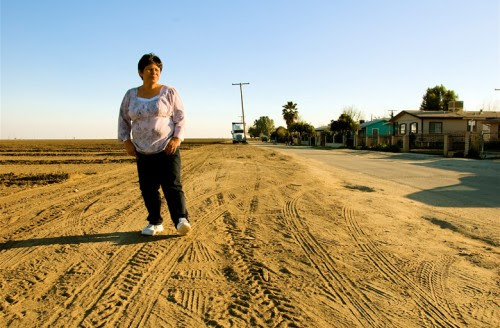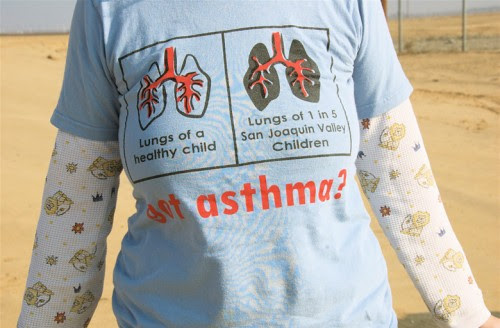|
Posted: 24 Feb 2015 06:33 AM PST
California’s Central Valley is a bread basket of America. It is the source of much of the country’s grapes, tree fruit, nuts, and vegetables. Many of the farms are massive, requiring large amounts of capital, land, and labor.
In the nearby small towns are the homes of the state’s farm laborers. They are primarily Latino. About half are undocumented. Most are poor and few have health care. Politically and economically weak, they are the primary human victims of pesticide drift. Pesticide drift occurs when chemicals leave the fields for which they’re intended and travel to where humans can be exposed. According to data summarized by geographer Jill Harrison for her article on the topic, California is a pesticide-intensive state. It accounts for 2-3% of all cropland in the U.S., but uses 25% of the pesticides. One in ten of registered pesticides are prone to drift and a third include chemicals that are “highly acutely toxic” or cause cancer, reproductive or developmental disorders, or brain damage. Officially, there are an average of 370 cases of pesticide poisoning due to drift every year, but farmworker advocates say that this captures 10% of the victims at best. Teresa DeAnda, an environmental justice advocate, stands on the dirt road between an agricultural field and her neighborhood (image from Voices from the Valley):  State officials and representatives of agriculture business minimize pesticide drift; Harrison calls this “down-scaling.” They claim it’s accidental, rare, and not an integral part of the system when it operates well. “Unfortunately from time to time we have tragic accidents,” says one Health Department official. “I think the number of incidents that have occurred given the, are really not that significant…” says another. “The system works,” says an Agricultural Commissioner, “Unfortunately, we have people who don’t follow the law.” All of these tactics serve to make the problem seem small and localized. It’s not easy to get politicians to pay attention to some of the weakest of their constituents, but activists have made some headway by what Harrison calls “pushing it up the scale.” Contesting its framing it as small problem by virtue of its frequency or impact, they argue that pesticide drift is routine, regular, and systemic. “These things happen every day,” says one resident. “You can smell [the pesticide use],” says another. “You can see it. When you drive, it gets on your windshield.” An activist argues: “The art of pesticide application is not precision delivery. It’s sloppy, and it often spills.” They further contest the downscaling by arguing that pesticide drift is harming the overall air quality. By describing it as air pollution, they make it a state of California problem, one that affects everyone. This makes it more difficult for big agriculture to say it’s no big deal. An activist upscales in Wasco, CA (image from Voices from the Valley):  Upscaling and downscaling are both part of the politics of scale, a tactic that involves making a problem seem big or little. Harrison notes that many environmentalists advocate a local approach. “The local,’” she writes, “is commonly touted as the space in which people can most directly voice their concerns and effect political change, due to local officials’ proximity to constituents and familiarity with local issues.” This case, though, suggests that justice isn’t one size fits all. If you’d like to know more about pesticide drift and the struggle for environmental justice in California, sociologist Tracy Perkins has started a website, called Voices from the Valley. Lisa Wade is a professor of sociology at Occidental College and the co-author of Gender: Ideas, Interactions, Institutions. You can follow her on Twitter and Facebook.(View original at http://thesocietypages.org/ |
|
Posted: 24 Feb 2015 05:00 AM PST
Philosopher Judith Butler has been influential across many disciplines, and sociology is no stranger to her works. She first drew widespread attention with her book Gender Trouble. In it, Butler questioned the supposed naturalness of both the male/female sex binary and the differences between men and women. Not natural at all, she argued, gender is performed. Butler has written over a dozen books and is a great scholar to be able to quote at parties if you want to impress upon others that you know your shit.

Found at The New School Free Press, via A Serving of Sociology.
Have a scholar we should commemorate? Send us a wacky pic and we will!
Lisa Wade is a professor of sociology at Occidental College and the co-author of Gender: Ideas, Interactions, Institutions. You can follow her on Twitter and Facebook. |
2015년 2월 24일 화요일
Sociological Images: Seeing Is Believing
피드 구독하기:
댓글 (Atom)











댓글 없음:
댓글 쓰기